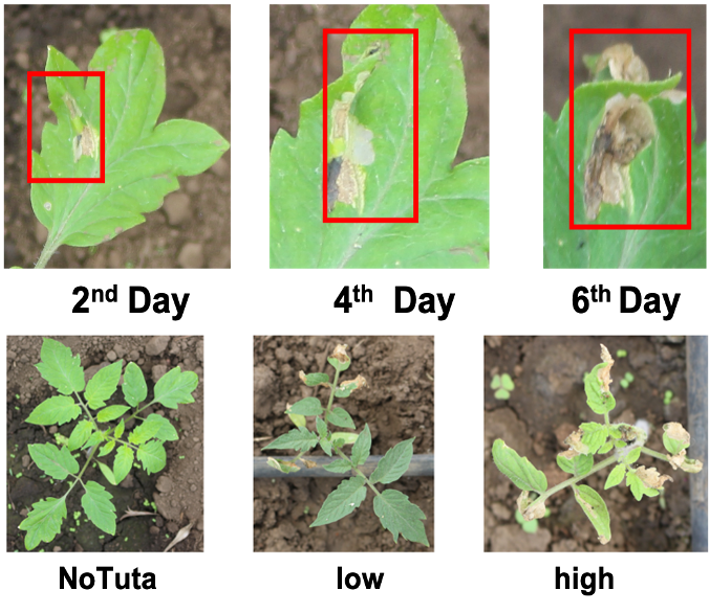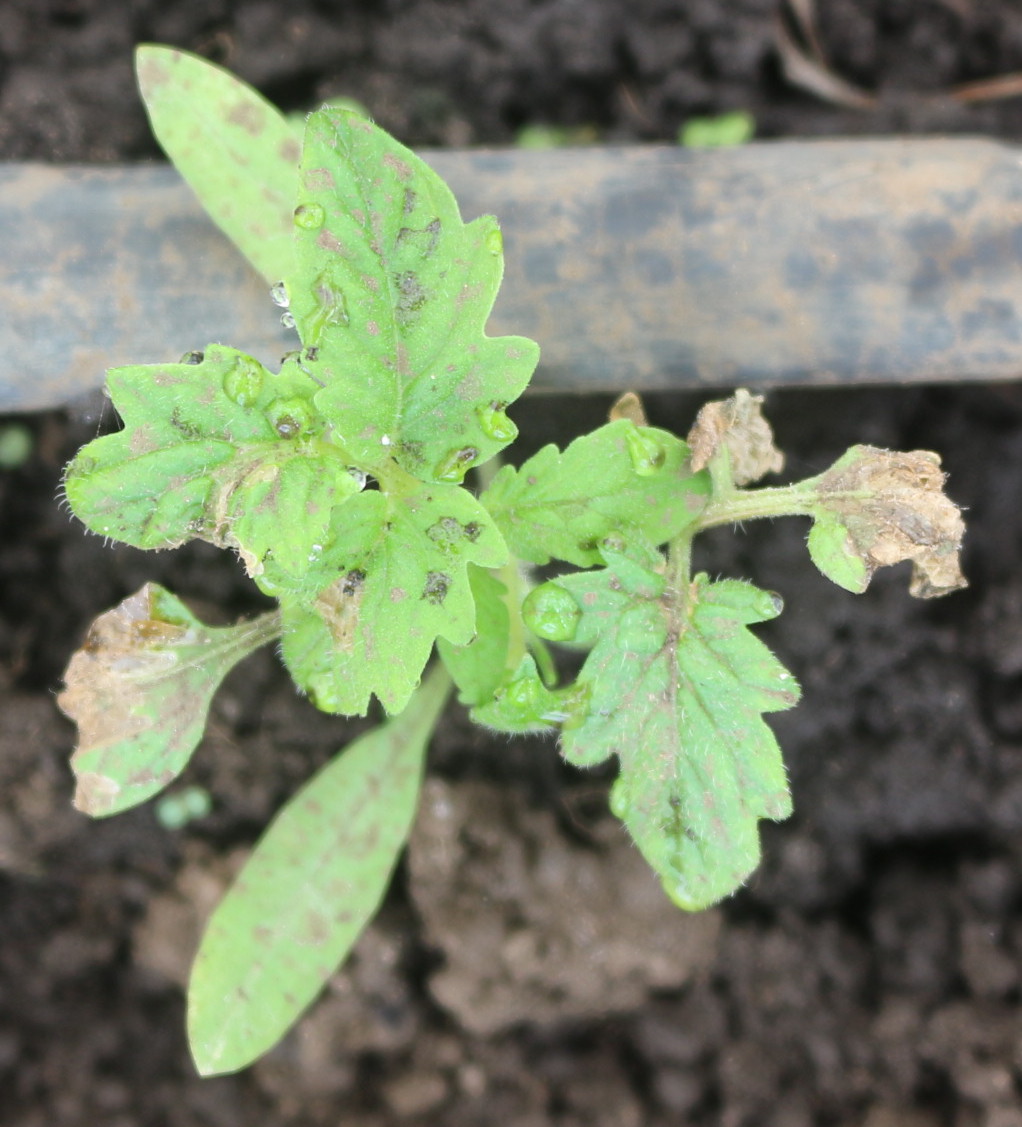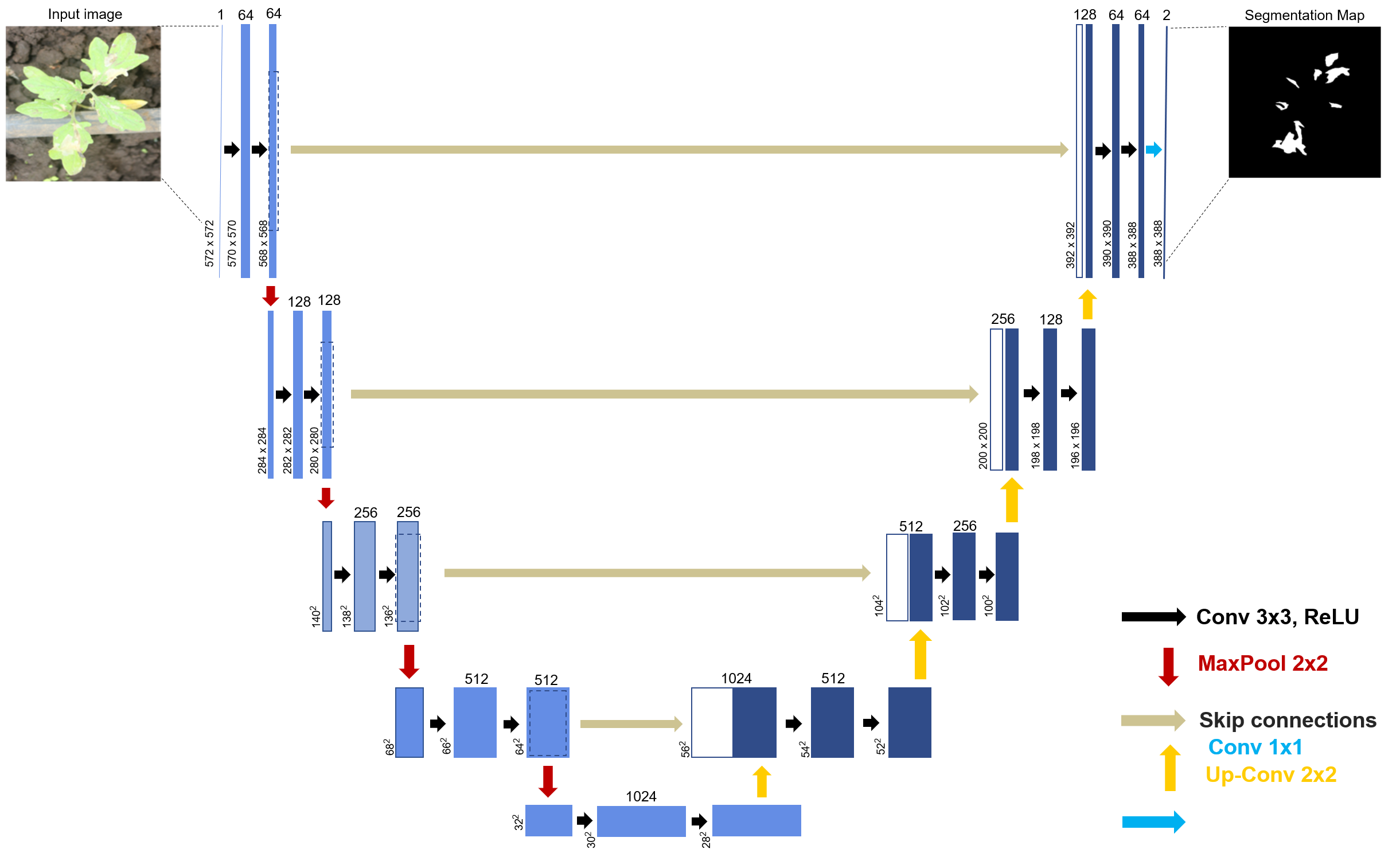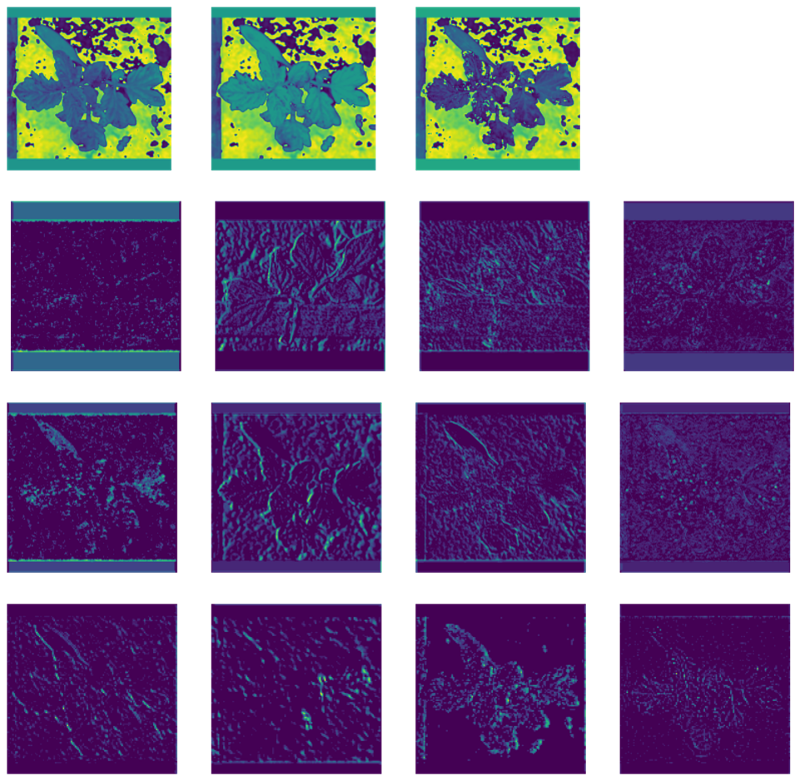Portfolio item number 1
Short description of portfolio item number 1
Short description of portfolio item number 1
Short description of portfolio item number 2 
Published in International Conference on Learning Representations (ICLR), 2020
 In this study, we propose a Convolutional Neural Network (CNN) approach in determining the effects of Tuta absoluta in tomato plants. Four CNN pre-trained architectures (VGG16, VGG19, ResNet and Inception-V3) were used in training classifiers on a dataset containing health and infested tomato leaves collected from real field experiments. Among the pre-trained architectures, experimental results showed that Inception-V3 yielded the best results with an average accuracy of 87.2 percent in estimating the severity status of Tuta absoluta in tomato plants. The pre-trained models could also easily identify High Tuta severity status compared to other severity status (Low tuta and No tuta)
In this study, we propose a Convolutional Neural Network (CNN) approach in determining the effects of Tuta absoluta in tomato plants. Four CNN pre-trained architectures (VGG16, VGG19, ResNet and Inception-V3) were used in training classifiers on a dataset containing health and infested tomato leaves collected from real field experiments. Among the pre-trained architectures, experimental results showed that Inception-V3 yielded the best results with an average accuracy of 87.2 percent in estimating the severity status of Tuta absoluta in tomato plants. The pre-trained models could also easily identify High Tuta severity status compared to other severity status (Low tuta and No tuta)
Recommended citation: Rubanga, D.P., Loyani, L.K., Richard, M., & Shimada, S. (2020). A Deep Learning Approach for Determining Effects of Tuta Absoluta in Tomato Plants Plants. International Conference on Learning Representations (ICLR) . https://doi.org/10.48550/arXiv.2004.04023
Published in Zenodo, 2020
 The images of tomato leafminer (Tuta absoluta) were taken in in-house plots between August 2018 and May 2019 in Arusha, Tanzania. Under net-house that were controlled from other others. T.absoluta larvae were inoculated on the commonly grown tomato varieties at the early growth stage (herein, on the second day after transplanting). The images were taken for the first 2 weeks after inoculation. Images captured the canopy of the plants. It is worth mentioning that dataset contains only Red-Green-Blue (RGB) colored images. The annotated dataset freely available to other researchers through an open access repository to facilitate further research in diagnosing Tuta absoluta’s damage to tomato plants
The images of tomato leafminer (Tuta absoluta) were taken in in-house plots between August 2018 and May 2019 in Arusha, Tanzania. Under net-house that were controlled from other others. T.absoluta larvae were inoculated on the commonly grown tomato varieties at the early growth stage (herein, on the second day after transplanting). The images were taken for the first 2 weeks after inoculation. Images captured the canopy of the plants. It is worth mentioning that dataset contains only Red-Green-Blue (RGB) colored images. The annotated dataset freely available to other researchers through an open access repository to facilitate further research in diagnosing Tuta absoluta’s damage to tomato plants
Recommended citation: Rubanga, D. P., Mkonyi L., Richard M., Zekeya N., Loyani L.K., Shimada S., & Machuve D. (2020). A Deep Learning Dataset for Tomato Pest Leafminer TUTA ABSOLUTA. Zenodo. https://doi.org/10.5281/ZENODO.4305416
Published in Applied Artificial Intelligence. Taylor & Francis, 2021
 Tuta absoluta is a major threat to tomato production, causing losses ranging from 80% to 100% when not properly managed. Early detection of T. absoluta’s effects on tomato plants is important in controlling and preventing severe pest damage on tomatoes. In this study, we propose semantic and instance segmentation models based on U-Net and Mask RCNN, deep Convolutional Neural Networks (CNN) to segment the effects of T. absoluta on tomato leaf images at pixel level using field data. The results show that Mask RCNN achieved a mean Average Precision of 85.67%, while the U-Net model achieved an Intersection over Union of 78.60% and Dice coefficient of 82.86%. Both models can precisely generate segmentations indicating the exact spots/areas infested by T. absoluta in tomato leaves. The model will help farmers and extension officers make informed decisions to improve tomato productivity and rescue farmers from annual losses.
Tuta absoluta is a major threat to tomato production, causing losses ranging from 80% to 100% when not properly managed. Early detection of T. absoluta’s effects on tomato plants is important in controlling and preventing severe pest damage on tomatoes. In this study, we propose semantic and instance segmentation models based on U-Net and Mask RCNN, deep Convolutional Neural Networks (CNN) to segment the effects of T. absoluta on tomato leaf images at pixel level using field data. The results show that Mask RCNN achieved a mean Average Precision of 85.67%, while the U-Net model achieved an Intersection over Union of 78.60% and Dice coefficient of 82.86%. Both models can precisely generate segmentations indicating the exact spots/areas infested by T. absoluta in tomato leaves. The model will help farmers and extension officers make informed decisions to improve tomato productivity and rescue farmers from annual losses.
Recommended citation: Loyani L., Bradshaw K., & Machuve D. (2021). Segmentation of Tuta absoluta’s damage on tomato plants: A computer vision approach. Applied Artificial Intelligence. Taylor & Francis. 35(14), 1107-1127. https://doi.org/10.1080/08839514.2021.1972254
Published in Engineering, Technology & Applied Science Research, 2021
 With the advances in technology, computer vision applications using deep learning methods like Convolutional Neural Networks (CNNs) have been extensively applied in agriculture. Deploying these CNN models on mobile phones is beneficial in making them accessible to everyone, especially farmers and agricultural extension officers. This paper aims to automate the detection of damages caused by a devastating tomato pest known as Tuta Absoluta. To accomplish this objective, a CNN segmentation model trained on a tomato leaf image dataset is deployed on a smartphone application for early and real-time diagnosis of the pest and effective management at early tomato growth stages. The application can precisely detect and segment the shapes of Tuta Absoluta-infected areas on tomato leaves with a minimum confidence of 70% in 5 seconds only.
With the advances in technology, computer vision applications using deep learning methods like Convolutional Neural Networks (CNNs) have been extensively applied in agriculture. Deploying these CNN models on mobile phones is beneficial in making them accessible to everyone, especially farmers and agricultural extension officers. This paper aims to automate the detection of damages caused by a devastating tomato pest known as Tuta Absoluta. To accomplish this objective, a CNN segmentation model trained on a tomato leaf image dataset is deployed on a smartphone application for early and real-time diagnosis of the pest and effective management at early tomato growth stages. The application can precisely detect and segment the shapes of Tuta Absoluta-infected areas on tomato leaves with a minimum confidence of 70% in 5 seconds only.
Recommended citation: Loyani, L., & Machuve, D. (2021). A Deep Learning-based Mobile Application for Segmenting Tuta Absoluta’s Damage on Tomato Plants. Engineering, Technology & Applied Science Research, 11(5), 7730–7737. https://doi.org/10.48084/etasr.4355
Published in Smart Agricultural Technology - Elsevier, 2024
 The invasion of the tomato leaf miner (Tuta absoluta) poses a significant threat to tomato productivity, leading to substantial yield losses for farmers. Currently, there is a lack of reliable methods for quantifying the effects of Tuta absoluta at an early stage before it causes significant damage. This research proposes a deep Convolutional Neural Network (CNN) model for the segmentation-based quantification of Tuta absoluta on tomato plants. The proposed quantification method employed a Mask RCNN model that achieved a mAP of 85.67 % and precisely detected and segmented the shapes of Tuta absoluta-infected areas on tomato leaves. The ability to accurately detect, segment and count Tuta mines in a tomato leaf image can have a significant impact on the agricultural industry by enabling farmers to quickly assess the extent of damage to their crops and take appropriate measures to prevent further losses.
The invasion of the tomato leaf miner (Tuta absoluta) poses a significant threat to tomato productivity, leading to substantial yield losses for farmers. Currently, there is a lack of reliable methods for quantifying the effects of Tuta absoluta at an early stage before it causes significant damage. This research proposes a deep Convolutional Neural Network (CNN) model for the segmentation-based quantification of Tuta absoluta on tomato plants. The proposed quantification method employed a Mask RCNN model that achieved a mAP of 85.67 % and precisely detected and segmented the shapes of Tuta absoluta-infected areas on tomato leaves. The ability to accurately detect, segment and count Tuta mines in a tomato leaf image can have a significant impact on the agricultural industry by enabling farmers to quickly assess the extent of damage to their crops and take appropriate measures to prevent further losses.
Recommended citation: Loyani, L., (2024). Segmentation-based Quantification of Tuta absoluta’s Damage on Tomato Plants. Smart Agricultural Technology, 7, 100415 https://doi.org/10.1016/J.ATECH.2024.100415
Published:
In December 2019, I attended the 3rd Black in AI (BAI) workshop co-located with 33rd Neural Information Processing Systems (NeurIPS 2019) conference at the Vancouver Convention Centre in Canada. This event marked my first international conference and my inaugural trip outside Tanzania, presenting a significant milestone in my career. My presentation, “Decision Support System for Farmers against Tuta Absoluta Effects on Tomato Plants,” highlighted the application of AI in agriculture. The workshop provided a unique platform for me to engage with experts from renowned universities and industries, expanding my understanding of AI and its global impact. This life-changing experience was made possible thanks to the full funding by BAI, reflecting their commitment to promoting diversity in the AI field. The knowledge and connections gained from this event have been instrumental in shaping my path in AI research and development.
Published:
In the midst of the global shift towards virtual events due to the COVID-19 pandemic, I had the distinct opportunity to present my research at the Computer Vision for Agriculture workshop. This event was part of the larger International Conference on Learning Representations (ICLR), hosted virtually from April 26th to 30th, 2020 in Addis Ababa, Ethiopia. My presentation, entitled “A Deep Learning Approach for Determining Effects of Tuta Absoluta in Tomato Plants,” focused on leveraging advanced AI techniques to tackle the challenges posed by Tuta absoluta, a pest that significantly impacts tomato crops. The innovative approach highlighted in my research emphasized the potential of deep learning in enhancing agricultural pest detection and management.
Published:
From July 24th to August 1st, 2020, researchers, data scientists, and practitioners from across the continent and beyond gathered virtually to explore the latest developments in data science and its applications. Among the many insightful contributions, I had the privilege to present my work titled “A Deep Learning Approach for Quantifying the Effects of Tuta absoluta in Tomato Plants” to a diverse and engaged audience in Kampala, Uganda, albeit remotely.
Published:
Participating in the 44th Mechanism Design for Social Good (MD4SG’20) conference, which took place online from August 17th to 19th, 2020, due to the COVID-19 pandemic, provided a unique platform to showcase my research on leveraging artificial intelligence in agriculture. My poster presentation, titled “A Deep Learning Approach for Determining Effects of Tuta absoluta in Tomato Plants,” highlighted the innovative use of deep learning techniques to identify and assess the impact of the Tuta absoluta pest on tomato crops. This research not only demonstrates the potential of AI to revolutionize agricultural practices by enabling more effective pest management strategies but also aligns with the conference’s theme of utilizing technology for societal good. The virtual format of MD4SG’20 allowed for an unprecedented level of global participation and collaboration, fostering a rich exchange of ideas and insights on the intersection of technology, design, and social impact, and underscoring the vital role of interdisciplinary approaches in addressing complex global challenges.
Published:
In late 2022, I had the remarkable opportunity to attend and present at the 6th Black in AI (BAI) workshop, which took place alongside the 36th Neural Information Processing Systems (NeurIPS) Conference at the New Orleans Ernest N. Morial Convention Center in New Orleans, Louisiana, thanks to the full funding provided by BAI. This organization, dedicated to increasing the representation of Black individuals in artificial intelligence, enabled me to share my research through a poster titled “Segmentation of Tuta absoluta’s Damage on Tomato Plants: A Computer Vision Approach.” The conference, running from November 28th to December 9th, was a convergence of leading minds in AI and machine learning, offering a rich platform for presenting my work on utilizing computer vision to tackle agricultural pests, specifically Tuta absoluta, which severely affects tomato crops globally.
Published:
In September 2023, I had the distinguished opportunity to participate in the Deep Learning Indaba (DLI2023) conference, an event celebrated for its contribution to the growth and ethical application of AI across Africa, held in Accra, Ghana. This conference, which took place from the 3rd to the 9th, served as a significant platform for me to showcase my research through both a poster and a spotlight talk titled “Segmentation of Tuta absoluta’s Damage on Tomato Plants: A Computer Vision Approach.” My work, focusing on utilizing advanced computer vision techniques to detect and assess the impact of the Tuta absoluta pest on tomato crops, was recognized with an honorable mention at the Weakly Supervised Computer Vision workshop. This accolade underscored the relevance and potential of applying AI solutions to critical agricultural challenges. The full funding of my attendance by DLI not only facilitated my participation but also emphasized the conference’s commitment to fostering a diverse and inclusive AI research community.
Published:
From September 1st to 7th, 2024, I had the incredible opportunity to attend the Deep Learning Indaba (DLI2024) Conference at Amadou Mahtar Mbow University (UAM) in Dakar, Senegal. This premier gathering brought together over 600 AI researchers, practitioners, and enthusiasts from across Africa and beyond, fostering a vibrant community dedicated to advancing AI on the continent. Thanks to full funding from DLI, I was able to engage in this enriching experience, which featured keynotes, tutorials, workshops, panel discussions, and paper presentations. The conference served as a vital platform for knowledge exchange, collaboration, and discussions on the unique challenges and opportunities shaping AI development in Africa.
Published:
From September 1st to 7th, 2024, I had the incredible opportunity to attend the Deep Learning Indaba (DLI2024) Conference at Amadou Mahtar Mbow University (UAM) in Dakar, Senegal. This premier gathering brought together over 600 AI researchers, practitioners, and enthusiasts from across Africa and beyond, fostering a vibrant community dedicated to advancing AI on the continent. Thanks to full funding from DLI, I was able to engage in this enriching experience, which featured keynotes, tutorials, workshops, panel discussions, and paper presentations. The conference served as a vital platform for knowledge exchange, collaboration, and discussions on the unique challenges and opportunities shaping AI development in Africa.
Undergraduate, Mwenge Catholic University, Department of Natural Sciences and Information Technology, 2021
Here, I taught a range of Computer Science subjects including Basic Computer Applications, Database and Database Management Systems, Android Mobile Application, System Analysis and Design, and Software Development.
Graduate, Nelson Mandela African Institution of Science and Technology, School of Computational and Communication Science and Engineering (CoCSE), 2022
Here, I assist in teaching the following courses for graduate students at the School of Computational and Communication Science and Engineering (CoCSE):